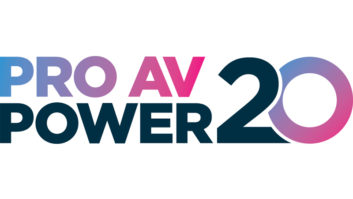
Crestron UK’s managing director talks to Paddy Baker about moving from AV to infrastructure – and whether the iPad is an opportunity or a threat
You introduced a new operating system at InfoComm. What was the background to that and how does it fit into Crestron’s development going forward?
We’ve very successfully deployed our existing platform that for the last seven or eight years. Then, it was about control systems talking to a projector, and a screen dropping down and a videoconferencing unit. Today, it’s all about integrating the rest of the world – it’s about going way beyond the room. That’s why we have specifically made our new control systems in such a way so they can do multiple tasks and many given stages.
So it supports things like voice over IP from touchscreens, integrated communications, integrating the computer network more, so you can use it as a device to access emails… there’s so many other aspects that we’re trying to keep it as open a platform to the IT world as we possibly can. Seven years ago it was only about AV – this time round we have to keep it as open as possible to the rest of the world.
And with the multi-tasking, one part of the system can be taken offline for upgrading without the whole thing shutting down.
What are the implications of this for the typical Crestron programmer?
We’ve only ever developed technology that is forwards and backwards compatible. Sure, there are new skill sets to be learned for us all, but I would say that’s only for us to develop our systems more in this century. At the moment people are still programming with the same code, they don’t have to go and retrain.
The only retraining they’ll need is if they want to start doing the other, more interesting, stuff that goes with it. So that’s where he will eventually come into it. So obviously anybody will need to go on training if you want to really push it further than what everybody else has been doing.
How important is Flash support in all this?
I think it’s extremely important. I was one of the first people to have an iPhone and when I first started using it I went, oh my god, Apple has changed the way we experience technology. There is so much information in my hand, I can do so much from this little unit – everything is in there, and it’s a very easy-to-use interface. And I said we’re going to have to up the ante on Crestron’s side in order to compete with this. And that’s why Flash really comes into this – the graphics have been pushed way beyond anybody’s expectations.
So a better user experience and a simpler programming experience?
Yes – it’s much more efficient from a programming point of view and a user point of view. It’s just mindblowing what it all can do… it makes it so much more interactive, so much more interesting to use. It’s a lot better – it’s the way it should be.
The other key announcement at InfoComm was the DigitalMedia 8G. You launched DigitalMedia last year and now you’re onto the second generation.
DigitalMedia is just unbelievable. It’s one product range which has really pushed AV signal distribution, switching, control into a different era. More than a third of our business now is DigitalMedia; a year ago it didn’t exist, so that’s remarkable.
The 8G is pushes it much further. So not only is it displaying much more, but you’re sending it all down one simple cable – literally any signal you want. That is really amazing.
When you look at it from an installer point of view – say you’ve got a display and you’ve got your equipment in the rack. If you were to change any equipment, or any video format or information you put into that rack, you can then send over that one cable. So even in a year’s time, if you decide to add 10 more new sources, you don’t have to add 10 more cables, or get a bigger switcher – you can get away with the same cabling infrastructure at any given time for the future. And that flexibility is exactly what customers want to hear.
Part of the thinking behind DigitalMedia is to do with the analogue sunset. How significant do you think that’s going to be for the install business and do you think that the implications have been fully grasped in the market?
Do you remember in the IT world, when the big thing was the millennium bug? I always compare it to that. Our industry should take this analogue sunset just as seriously and use it as a way to make money. It’s a way to go to your customer and say, you’ve got to upgrade your technology and come into the digital age. Otherwise you’ll end up with a blank screen in a year or two’s time.
What is the European launch date for the new control system?
They’re going to start releasing the new control system in limited amounts to make sure that it all runs according to plan. I’m thinking that we’re going to release it mid-September.
What do you think the world of Crestron will be like in five or 10 years’ time?
Crestron’s success has always been being in tune with the times – when technology changes, making sure that we’re playing onto that. Now the standards are changing, everything’s going HDMI, right. DVI is dying, RGB is dying, and so on.
We need to get away from the legacy of being a touchpanel and control systems company. We are an infrastructure company. We want to be your infrastructure, we want to be the glue that brings it all together… whether it be your building management and lighting control, HVAC control, AV, IT…
Would you say you have a clear road map for that?
We already have the pieces in place to be able to achieve that. We’ve got the vision, we’ve got the road map, but the actual spark that makes the engine tick is the software. Being able to monitor and control all that equipment with very easy-to-use software – that is the true spark that makes the engine turn. So I’m confident that we are getting our act together. I’m confident that the future looks very bright in terms of being able to offer that total package.
If you want to put your iPhone as a front end to control it, or your iPad or whatever other third party device, that’s fine. You can use a third party product, but with us the real vision is to bring it into becoming that infrastructure – that backbone.
How significant will the impact of the iPad be, and how is Crestron approaching that?
Everybody is very excited about it because it will open up the market. We will see many more systems being deployed in rooms where there would never be a budget for a touch-panel control system, so now we’ll be able to sell them other equipment to go with it. I still am a bit sceptical that people would use iPads in meeting rooms because they’re very attractive and they could easily get lost. Whereas most of our equipment is built-in and bolted to the table.
When you look at the residential market, again, I think the iPad will open up the market. It puts the technology in the hands of people that normally wouldn’t be able to afford it. If they say, ‘I would like to be able to control my life through an iPad and there’s a Crestron app I can download free off the apps site’, then they can control their lighting and then they’re going to have to call us to supply them their control system to control their lighting dimmer. They’re going to ask us for their lighting dimmer; they’re going to ask us for their thermostat and we can start then slowing adding more bits to systems.
So for people who in the past wouldn’t be able to spend £3,000 on a touchpanel, now they’re spending £500 on an iPad, hopefully they will have £2,500 that they can spend with us on lighting, thermostats and a control system – and these are people that we’d never reached out to. So it will affect our touchpanel sales to a certain extent, but the people who use our touchpanels want something reliable and dedicated – they want to pick up a device and immediately be able to control it. They don’t want to wait for a network connection, or to go through menus to access the control. They don’t mind spending £3,000 on a touchpanel. But to the people who do mind, the iPad should open up the market for us.
So other than perhaps taking away some sales of touchpanels, do you see any other downsides to the iPad?
No, I think it’s a magnificent device. It’s just unbelievable how Apple has revolutionised the music business and I think the iPad will revolutionise the way we access information – surfing the internet, lounging around just looking at pictures – and being able to add on the control of your lights and your TV from it is wonderful. It’s a very nice addition and again it reaches out to a market that we’ve never, ever reached out to before. So that makes it very interesting.







